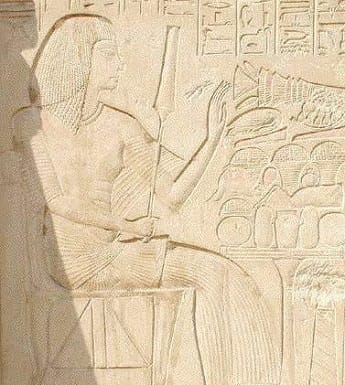Introduction - Ancient Egyptian Government
Almost everyone has heard of the powerful Egyptian Pharaohs and how they ruled over ancient Egypt. The Pharaoh was indeed the supreme ruler, however, as we will explain on this page, the ancient Egyptian government involved numerous subordinates who aided the Pharaoh with governing this ancient civilization. These advisors and officials made up the royal court and, since religion was an important part of ancient Egyptian life, many were where priests. The interesting, kid-friendly, list of facts on this page provides information on what type of government ancient Egypt had, who the important people were in the government, and how religion and government were intertwined in this society.Click here for a great selection of Amazon.com books about Ancient Egypt.
Pharaoh
- The ancient Egyptian government was both a monarchy, a government ruled by one person (the Pharaoh), and a theocracy which is a government ruled by a religious leader or leaders.
- The Egyptian Pharaoh was not only the supreme leader of the government but was also the supreme religious leader. In fact the pharaoh was considered to be a god.
- Although the Pharaoh had numerous subordinates managing various aspects of the Egyptian government he (or she) had the final say in all matters.
Ancient Egyptian Government - Vizier
- The most powerful member of ancient Egypt's government other that the Pharaoh was the vizier.
- Often a member of the Pharaoh's family the vizier was responsible for running the ancient Egyptian government under the supervision of the Pharaoh.
- Viziers were often depicted in Egyptian art wearing a long white robe; the white represented their impartiality.
- Perhaps the most famous vizier was Imhotep who served under the 3rd dynasty Pharaoh Djoser. He is credited with designing and building the Pyramid of Djoser; the first step pyramid. His talents were numerous and he was one of the earliest architects and engineers in history.
Ancient Egyptian Government - Nomarks
- Nomarks ranked in importance below viziers.
- Nomarks ruled over provinces called nomes (or sepat). Ancient Egypt was divided into several nomes over which Nomarks were given a lot of power.
- Sometimes Nomarks would inherit their position and sometimes they would be appointed to rule a region (nome) by the Pharaoh.
Ancient Egyptian Government - Treasurer
- The treasurer was the chief economic administrator and advisor to the Pharaoh.
- During the Middle Kingdom the government office of treasurer became very important in the royal court.
General of Armies
- The General of Armies advised the Pharaoh on matters of war and securing the ancient Egyptian civilization.
- This advisor was the top military commander.
- This government position was extremely important throughout ancient Egypt's history due to the fact that this civilization was often expanding its borders through warfare and was often threatened by outsiders.
Other Government Facts
- Ancient Egypt was by no means a democracy. There were no elections and the average citizen had no say in the running of the government.
- The Pharaoh's wives were very powerful and would sometimes make important decisions regarding the government.
- Scribes, who were people who had mastered writing, were very important to the government. They recorded important information such as taxes collected.
